|
What is the Meaning of Creation?
 The craving for unity and coherence is the
predominant
feature of a mature mind. All science, all philosophy, all art
are
a search after it. But unity is a task; not a condition. The
world lies in strife, in discord, in divergence. Unity is beyond,
not
within, reality. ... The world is not one with God, and this is why his
power
does not surge unhampered throughout all stages of being. Creature
is detached from the Creator, and the universe is in a state of
spiritual disorder. Yet God has not withdrawn entirely from this
world. The spirit of this unity hovers over the face of all
plurality; and the major
trend of all our thinking and striving is its mighty intimation. The
goal of all efforts is to bring about the restitution of the unity of
God
and world. (Abraham Joshua Heschel in Living Religions, 280; cf. 270) The craving for unity and coherence is the
predominant
feature of a mature mind. All science, all philosophy, all art
are
a search after it. But unity is a task; not a condition. The
world lies in strife, in discord, in divergence. Unity is beyond,
not
within, reality. ... The world is not one with God, and this is why his
power
does not surge unhampered throughout all stages of being. Creature
is detached from the Creator, and the universe is in a state of
spiritual disorder. Yet God has not withdrawn entirely from this
world. The spirit of this unity hovers over the face of all
plurality; and the major
trend of all our thinking and striving is its mighty intimation. The
goal of all efforts is to bring about the restitution of the unity of
God
and world. (Abraham Joshua Heschel in Living Religions, 280; cf. 270) |
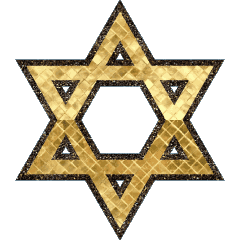
What is the
Meaning of Sin?
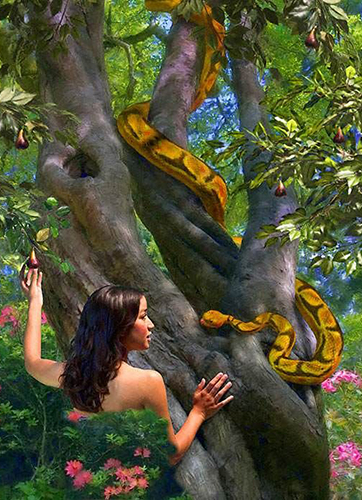 15 The Lord God took the man and put him in the Garden of Eden to work it and take care of it. 16 And the Lord God commanded the man, “You are free to eat from any tree in the garden; 17 but you must not eat from the tree of the knowledge of good and evil, for when you eat from it you will certainly die.” ... 3 Now the serpent was more crafty than any of the wild animals the Lord God had made. He said to the woman, “Did God really say, ‘You must not eat from any tree in the garden’?” 15 The Lord God took the man and put him in the Garden of Eden to work it and take care of it. 16 And the Lord God commanded the man, “You are free to eat from any tree in the garden; 17 but you must not eat from the tree of the knowledge of good and evil, for when you eat from it you will certainly die.” ... 3 Now the serpent was more crafty than any of the wild animals the Lord God had made. He said to the woman, “Did God really say, ‘You must not eat from any tree in the garden’?” 2 The woman said to the serpent, “We may eat fruit from the trees in the garden, 3 but
God did say, ‘You must not eat fruit from the tree that is in the
middle of the garden, and you must not touch it, or you will die.’” 4 “You will not certainly die,” the serpent said to the woman. 5 “For God knows that when you eat from it your eyes will be opened, and you will be like God, knowing good and evil.” 6 When
the woman saw that the fruit of the tree was good for food and pleasing
to the eye, and also desirable for gaining wisdom, she took some and
ate it. She also gave some to her husband, who was with her, and he ate
it. 7 Then
the eyes of both of them were opened, and they realized they were
naked; so they sewed fig leaves together and made coverings for
themselves.
8 Then the man and his wife heard the sound of the Lord God as he was walking in the garden in the cool of the day, and they hid from the Lord God among the trees of the garden. 9 But the Lord God called to the man, “Where are you?” 10 He answered, “I heard you in the garden, and I was afraid because I was naked; so I hid.” 11 And he said, “Who told you that you were naked? Have you eaten from the tree that I commanded you not to eat from?” 12 The man said, “The woman you put here with me — she gave me some fruit from the tree, and I ate it.” ... 22 And the Lord
God said, “The man has now become like one of us, knowing good and
evil. He must not be allowed to reach out his hand and take also from
the tree of life and eat, and live forever.” 23 So the Lord God banished him from the Garden of Eden to work the ground from which he had been taken. 24 After he drove the man out, he placed on the east side of the Garden of Eden cherubim and a flaming sword flashing back and forth to guard the way to the tree of life. (NIV: Genesis 2:15-3:24)
Was it a sin for Adam and Eve to eat the forbidden fruit?

Are Jewish and Christian interpretations of this story the same?

What is the Meaning of Morality?
With the establishment of the First Temple
(c. 10th/9th century BCE), the priesthood formalized the practice of
atoning for sin through sacrificial offerings, the most important of which took place on Yom Kippur (The Day of Atonement). This approach was
challenged, however, by the prophet Isaiah (8th-7th centuries BCE), who
insisted that God was not interested in the Jews’ sacrificial
offerings, but in their moral conduct:
|
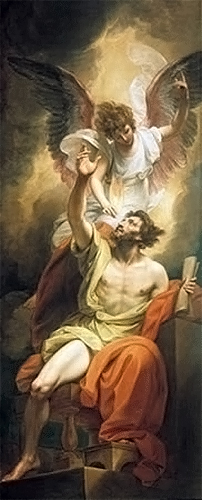 Hear, O heavens, and give ear, O earth, For the Lord has spoken: “I reared children and brought them up —
And they have rebelled against Me! ... Ah, sinful nation! People laden
with iniquity! Brood of evildoers! Depraved children! They have
forsaken the Lord, Spurned the Holy One of Israel, Turned their backs
[on Him]. ... Hear, O heavens, and give ear, O earth, For the Lord has spoken: “I reared children and brought them up —
And they have rebelled against Me! ... Ah, sinful nation! People laden
with iniquity! Brood of evildoers! Depraved children! They have
forsaken the Lord, Spurned the Holy One of Israel, Turned their backs
[on Him]. ...
“What
need have I of all your
sacrifices?”
says the Lord. “I am sated with burnt offerings of rams,
And suet
of
fatlings, And blood of bulls; And I have no delight in lambs and
he-goats. That you come to appear before Me — Who asked that
of
you? Trample My
courts no more; Bringing oblations is futile, Incense is offensive to
Me. ...
And when you lift up your hands, I will turn My eyes away from
you; Though you pray at length, I will not listen. Your hands are
stained with crime — Wash yourselves clean; Put your evil doings away
from My sight. Cease to do evil; Learn to do good. Devote
yourselves to justice; Aid the wronged. Uphold the rights of the
orphan; Defend the cause of the widow.
“Come, let us reach an understanding, — says
the
Lord. Be your sins like crimson, They can turn snow-white; Be
they
red as dyed wool, They can become like fleece.” If, then, you
agree and give heed, You will eat the good things of the earth; But if you
refuse
and disobey, You will be devoured [by] the sword. For it was the
Lord
who spoke. (An Anthology of Living Religions, 196 [Isaiah 1:2-20])
|

What is the Meaning of Torah & Mishnah
& their Commentaries ~ Midrash & Talmud?
After the destruction of the temple in 70 CE, the
Jews
shifted their focus from sacrificial offerings to the study and
practice
of the Torah (Pentateuch) and the Mishnah (Oral
Teachings) — though it should be noted that Yom Kippur (The Day of Atonement)
has remained the holiest day of the year, although the obligatory
fasting and prayers are no longer accompanied by animal sacrifices. The
primary focus on Torah and Mishnah led to the
development
of two new collections of writings: Midrash (interpretations
of the
Torah) and Talmud
(Commentaries
on the Mishnah). The
following
story from the Babylonian Talmud (1st century CE) illustrates the
significance of this new emphasis on the search for meaning within the
Torah and the Mishnah:
|
On that day Rabbi Eliezer
brought forward
all
of the arguments in the world [in favor of his position on a certain
matter
of ritual cleanliness], but they [his colleagues] did not accept them
from
him.
He said to them: “If the law agrees with me, let this
carob-tree
prove it.” The carob-tree leaped a hundred cubits from its place
in
the garden. The sages replied: “No proof can be brought
from
a carob-tree.” He said to them: “If the law agrees with me,
let
this stream of water prove it.” The stream of water began to flow
backwards. The sages replied: “No proof can be brought from a stream of
water.” Again he said to them: “If the law agrees with me, let the walls
of
this schoolhouse prove it.” The walls began to shake and incline
to
fall. Rabbi Joshua leaped up and rebuked the walls saying: “When
disciples of sages engage in legal dispute what is your
relevance?”
In honor of Rabbi Joshua the walls did not tumble. In honor or
Rabbi
Eliezer they did not right themselves, and are still inclined even to
this
day. Again Rabbi Eliezer said to the sages: “If the law
agrees
with me, let it be proved from Heaven.” A divine voice came forth
and
said: “Why do you dispute with Rabbi Eliezer, for in all matters
the
law agrees with him!”
But Rabbi Joshua rose to his feet again and
exclaimed: “It is not in heaven.” (cf. Deut. 30:12; Rabbi Jeremiah explained, “The
Law
was given at Sinai and we no longer give heed to heavenly voices, for
in
that Law it is stated: ‘One follows the majority.’” God’s
truth,
divine law, is not determined by miracles or heavenly voices, but by
the
collegium of rabbis, men learned in the law, committed to the law and
expert
in its application to the life of the pious community.”)
Some
time
later, Rabbi Nathan met the prophet Elijah and asked him: “What
did
the Holy One, blessed be He, do when rebuked by Rabbi Joshua?” Elijah
replied: “He laughed with joy saying ‘My children have defeated
me,
my children have defeated me.’” (World Religions and
Global
Ethics, 166 [Babylonian Talmud, Bava Metzia 59a-b]) |
Why does God laugh with joy, saying: "My
children
have defeated me, my children have defeated me"?

What does this tell us about the Jewish "Search for Meaning"?
The roots of the messianic dimension of Judaism lie in the Book of Isaiah, where God says that He will turn His hand against the sinful nation of Israel in order to “thoroughly purge away your dross and remove all your impurities” (Isaiah 1:25), but will ultimately “restore your leaders as in days of old” (Isaiah 1:26) so that Israel can serve as a “light unto the nations”:
2 This is what Isaiah son of Amoz saw concerning Judah and Jerusalem:
2 In the last days
|
the mountain of the Lord’s temple will be established
as the highest of the mountains;
it will be exalted above the hills,
and all nations will stream to it.
|
3 Many peoples will come and say,
“Come, let us go up to the mountain of the Lord,
to the temple of the God of Jacob.
He will teach us his ways,
so that we may walk in his paths.”
The law will go out from Zion,
the word of the Lord from Jerusalem.
4 He will judge between the nations
and will settle disputes for many peoples.
They will beat their swords into plowshares
and their spears into pruning hooks.
Nation will not take up sword against nation,
nor will they train for war anymore.
5 Come, descendants of Jacob,
let us walk in the light of the Lord. (NIV: Isaiah 2:1-5)
|
|
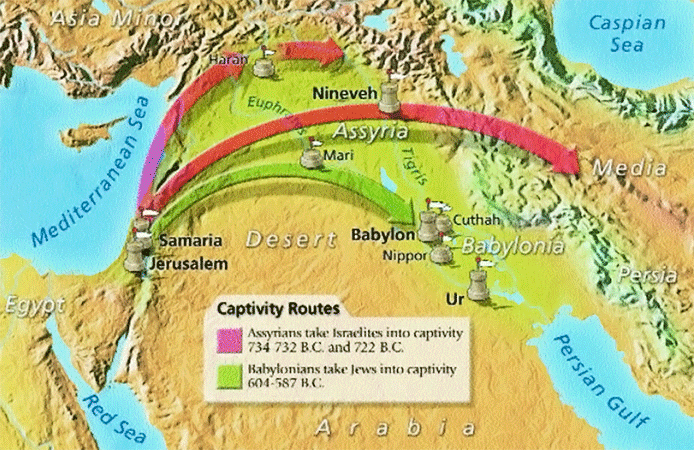 |
The first half of this prophecy was fulfilled when the northern Kingdom of Israel was conquered
by the Assyrians in 721 BCE and the southern Kingdom of Judah was conquered by the Babylonians in 586 BCE. The loss of the north resulted in the disappearance of ten of the original twelve tribes of Israel, while the loss of the south led to the exile of the Judean elite to Babylon. When Cyrus the Great
conquered Babylon and allowed the Jews to return to their homeland and
rebuild the Temple in Jerusalem, Jews referred to him as a messiah, which literally
means one who is “annointed” by God. However, the region remained under foreign sovereignty, with the Persians being replaced by Alexander the Great and then the Seleucids. It was in this context that the Jews began to yearn for the second half of the Isaian prophecy — for the “last days” when Israel will serve as a “light unto the nations.” In the second century BCE, the Book of Daniel responded to this yearning with a new prophecy:
|
2 24 Then Daniel went to Arioch,
whom the king had appointed to execute the wise men of Babylon, and
said to him, “Do not execute the wise men of Babylon. Take me to the
king, and I will interpret his dream for him.”
25 Arioch
took Daniel to the king at once and said, “I have found a man among the
exiles from Judah who can tell the king what his dream means.”
26 The king asked Daniel (also called Belteshazzar), “Are you able to tell me what I saw in my dream and interpret it?”
27 Daniel replied, “No wise man, enchanter, magician or diviner can explain to the king the mystery he has asked about, 28 but
there is a God in heaven who reveals mysteries. He has shown King
Nebuchadnezzar what will happen in days to come. Your dream and the
visions that passed through your mind as you were lying in bed are
these:
29 “As
Your Majesty was lying there, your mind turned to things to come, and
the revealer of mysteries showed you what is going to happen. 30 As for me, this mystery has been revealed
to me, not because I have greater wisdom than anyone else alive, but so
that Your Majesty may know the interpretation and that you may
understand what went through your mind.
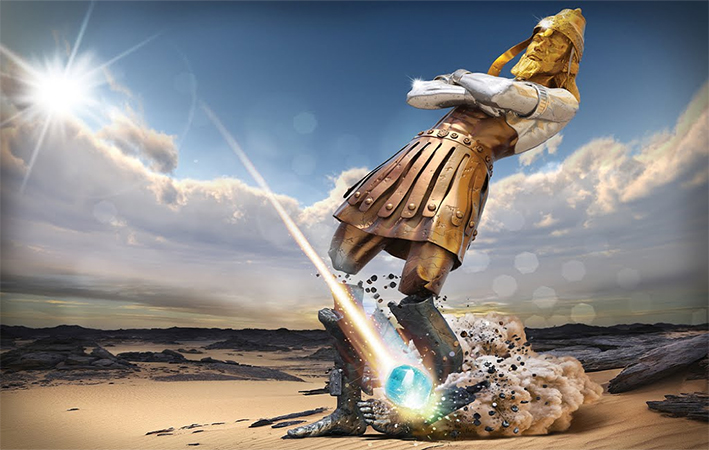
|
31 “Your Majesty looked, and there before you stood a large statue — an enormous, dazzling statue, awesome in appearance. 32 The head of the statue was made of pure gold, its chest and arms of silver, its belly and thighs of bronze, 33 its legs of iron, its feet partly of iron and partly of baked clay. 34 While
you were watching, a rock was cut out, but not by human hands. It
struck the statue on its feet of iron and clay and smashed them. 35 Then
the iron, the clay, the bronze, the silver and the gold were all broken
to pieces and became like chaff on a threshing floor in the summer. The
wind swept them away without leaving a trace. But the rock that struck
the statue became a huge mountain and filled the whole earth.
36 “This was the dream, and now we will interpret it to the king. 37 Your Majesty, you are the king of kings. The God of heaven has given you dominion and power and might and glory; 38 in
your hands he has placed all mankind and the beasts of the field and
the birds in the sky. Wherever they live, he has made you ruler over
them all. You are that head of gold.
39 “After you, another kingdom will arise, inferior to yours. Next, a third kingdom, one of bronze, will rule over the whole earth. 40 Finally,
there will be a fourth kingdom, strong as iron — for iron breaks and
smashes everything — and as iron breaks things to pieces, so it will crush
and break all the others. 41 Just
as you saw that the feet and toes were partly of baked clay and partly
of iron, so this will be a divided kingdom; yet it will have some of the
strength of iron in it, even as you saw iron mixed with clay. 42 As the toes were partly iron and partly clay, so this kingdom will be partly strong and partly brittle. 43 And
just as you saw the iron mixed with baked clay, so the people will be a
mixture and will not remain united, any more than iron mixes with clay.
44 “In
the time of those kings, the God of heaven will set up a kingdom that
will never be destroyed, nor will it be left to another people. It will
crush all those kingdoms and bring them to an end, but it will itself endure forever. 45 This
is the meaning of the vision of the rock cut out of a mountain, but not
by human hands — a rock that broke the iron, the bronze, the clay, the
silver and the gold to pieces. (NIV: Daniel 2:24-44)
7 In
the first year of Belshazzar king of Babylon, Daniel had a dream, and
visions passed through his mind as he was lying in bed. He wrote down
the substance of his dream.
2 Daniel said “In my vision at night I looked, and there before me were the four winds of heaven churning up the great sea. 3 Four great beasts, each different from the others, came up out of the sea. ... 11 ... “I kept looking until the [fourth] beast was slain and its body destroyed and thrown into the blazing fire. 12 (The other beasts had been stripped of their authority, but were allowed to live for a period of time.)
13 “In my vision at night I looked, and there before me was one like a son of man, coming with the clouds of heaven. He approached the Ancient of Days [i.e., God] and was led into his presence. 14 He
was given authority, glory and sovereign power; all nations and peoples
of every language worshiped him [note: the Complete Jewish Bible translates
this line as “To him was given rulership, glory and a kingdom, so that
all peoples, nations and languages should serve him”]. His dominion is an everlasting
dominion that will not pass away, and his kingdom is one that will
never be destroyed. ...
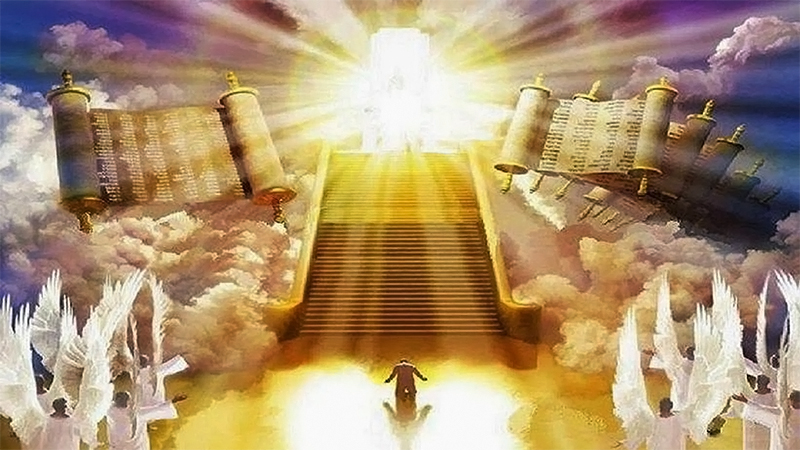 |
23 The
fourth beast is a fourth kingdom that will appear on earth. It will be
different from all the other kingdoms and will devour the whole earth,
trampling it down and crushing it. 24 The
ten horns are ten kings who will come from this kingdom. After them
another king will arise, different from the earlier ones; he will
subdue three kings. 25 He
will speak against the Most High and oppress his holy people and try to
change the set times and the laws. The holy people will be delivered
into his hands for a time, times and a half time.
26 “‘But the court will sit, and his power will be taken away and completely destroyed forever. 27 Then
the sovereignty, power and greatness of all the kingdoms under heaven
will be handed over to the holy people of the Most High. His kingdom
will be an everlasting kingdom, and all rulers will worship and obey
him’ [note: the Complete Jewish Bible has “Their kingdom is an everlasting kingdom, and all rulers will serve and obey them”]. (NIV: Daniel 7:1-27)
How do Jewish and Christian interpretations of Daniel differ?
By the first century CE, expectations had
developed that through this Messiah, God would gather the chosen people
and not only free them from oppression but also reinstate Jewish
political sovereignty in the land of Israel. The
messianic end of the age, or end of the world, would be heralded by a
period of great oppression and wickedness. Many felt that this time was
surely at hand. There were some Jews who felt that Jesus was the
long-awaited Messiah. (Living Religions, 263-4)
|
What did the Jews expect of a messiah ...
and why did most Jews ultimately decide that Jesus was not the messiah?
|

|
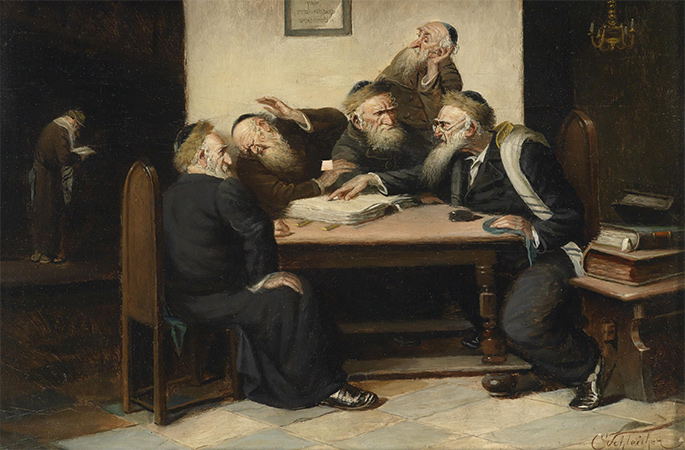

 15 The Lord God took the man and put him in the Garden of Eden to work it and take care of it. 16 And the Lord God commanded the man, “You are free to eat from any tree in the garden; 17 but you must not eat from the tree of the knowledge of good and evil, for when you eat from it you will certainly die.” ... 3 Now the serpent was more crafty than any of the wild animals the Lord God had made. He said to the woman, “Did God really say, ‘You must not eat from any tree in the garden’?”
15 The Lord God took the man and put him in the Garden of Eden to work it and take care of it. 16 And the Lord God commanded the man, “You are free to eat from any tree in the garden; 17 but you must not eat from the tree of the knowledge of good and evil, for when you eat from it you will certainly die.” ... 3 Now the serpent was more crafty than any of the wild animals the Lord God had made. He said to the woman, “Did God really say, ‘You must not eat from any tree in the garden’?” 